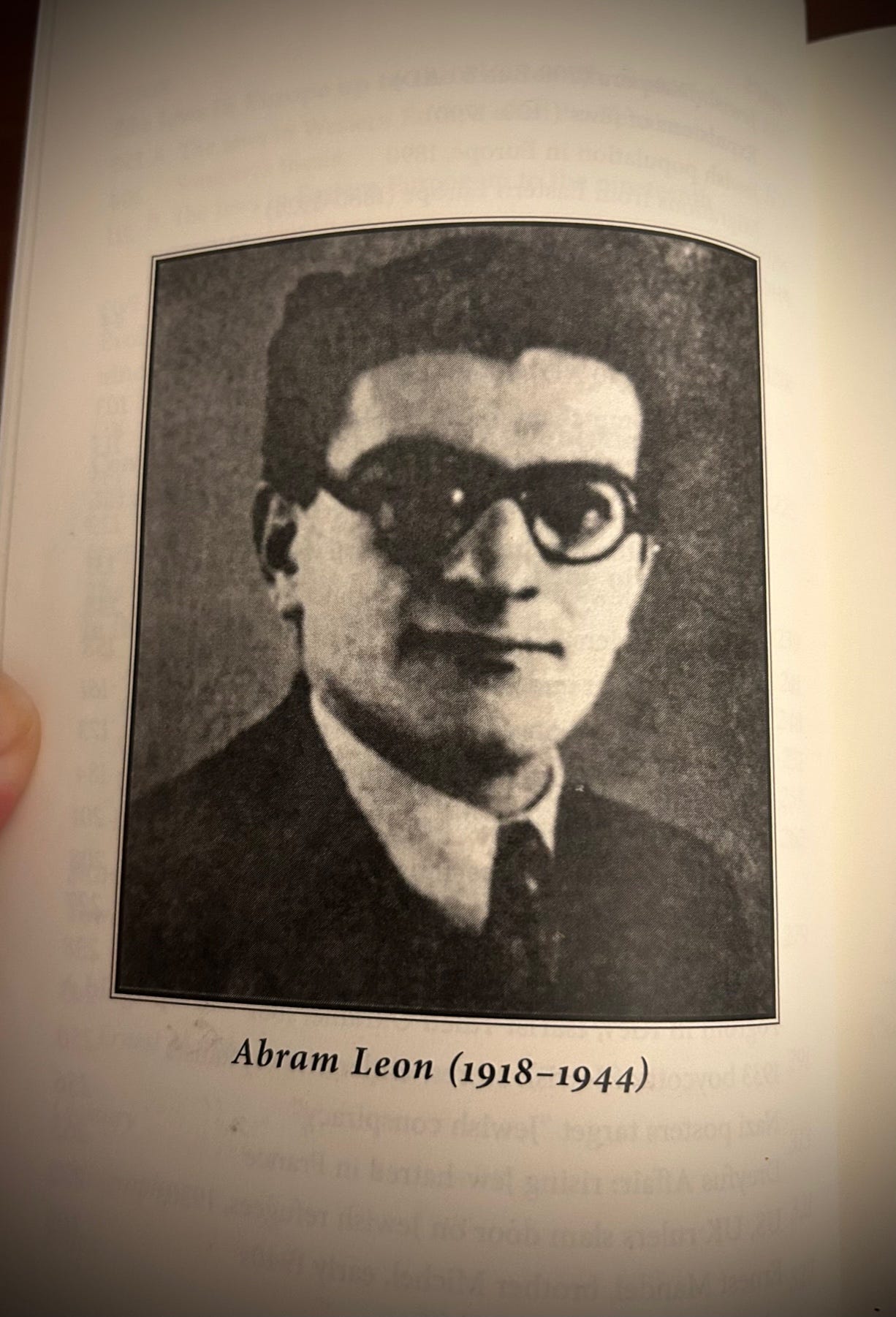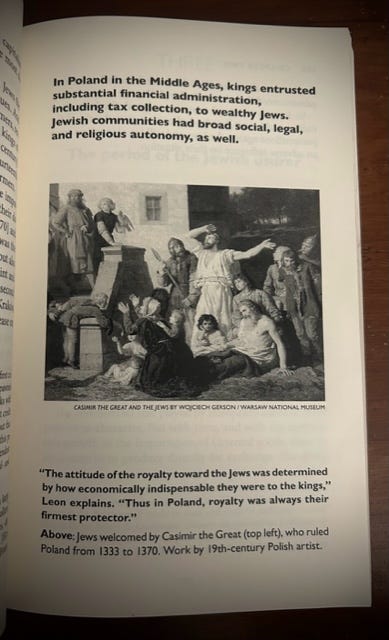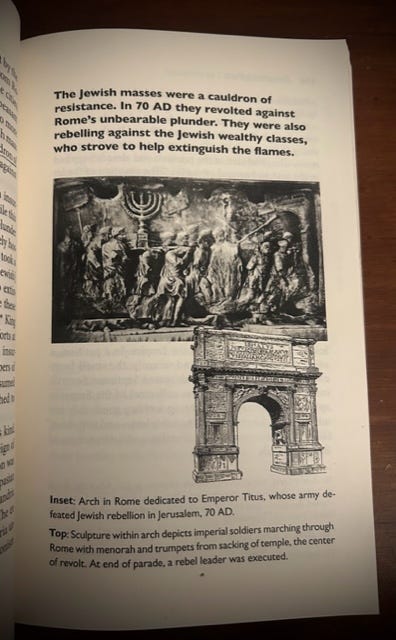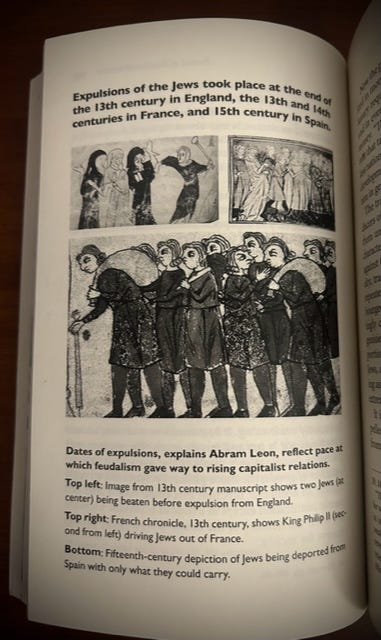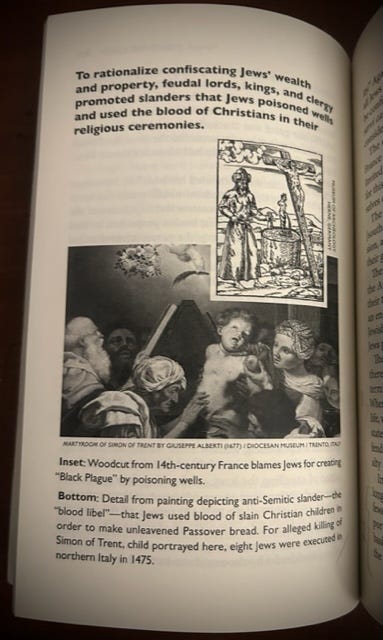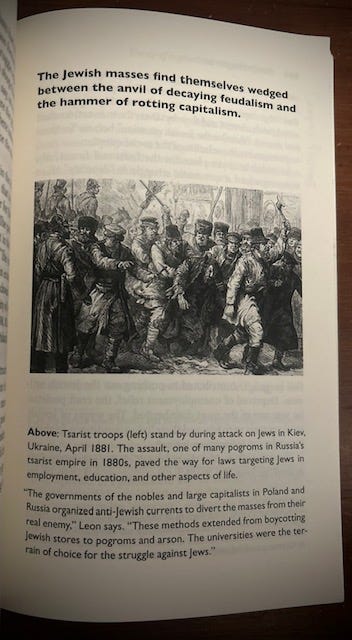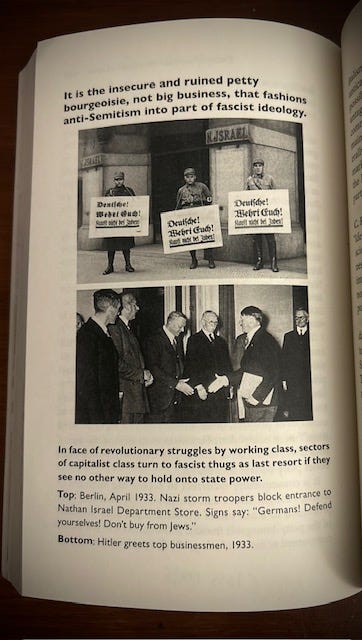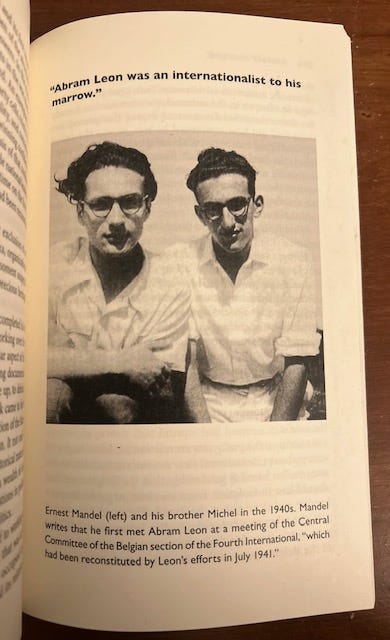Zionism Versus Marxism in the Fight Against Antisemitism
The historic evolution of antisemitism, its political implications yesterday, today.
Monthly Book Review.
“The Jewish Question: A Marxist interpretation” by Abram Leon, (originally published in 1946), translated by Duncan Ferguson, Pathfinder Press, 2020, 4th edition, 347 pp, $17;
“The Fight Against Jew-Hatred and Pogroms in the Imperialist Epoch”, Pathfinder Press, 2023, 1st edition, 184pp, $10; and
“The Jewish State (Der Judenstaat): An attempt at a modern solution to the Jewish question” by Theodor Hertzl, Vienna, April 1896, 68pp.
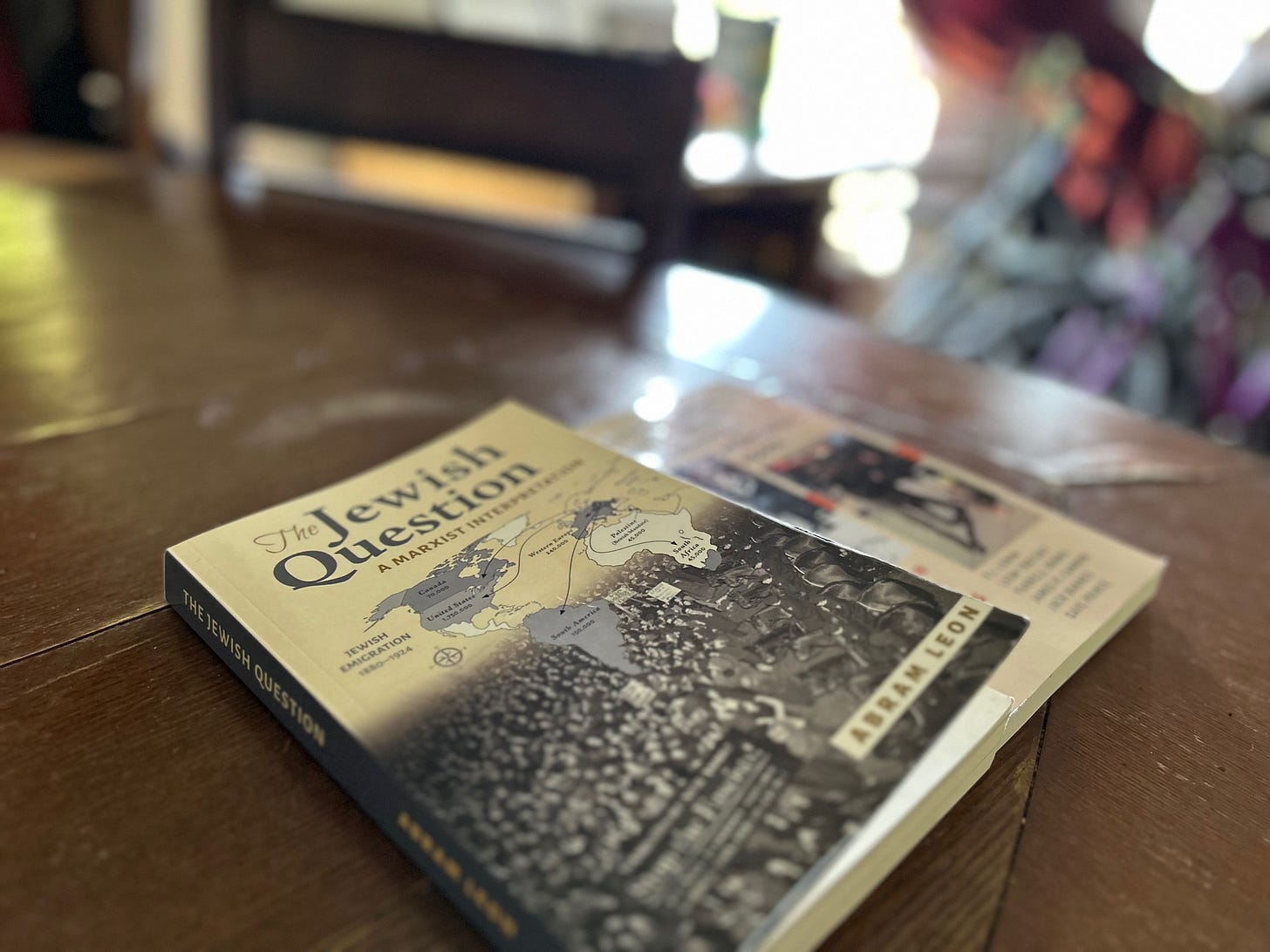
“To study the evolution of the question is not exclusively of academic interest. Without a thorough study of Jewish history, it is difficult to understand the Jewish question in modern times. The plight of the Jews in the twentieth [and twenty-first] century is intimately bound up with their historical past. Every social formation represents a stage in the social process. Being is only a moment in the process of becoming. In order to undertake an analysis of the Jewish question in its present phase of development, it is indispensable to know its historical roots.”
— Abram Leon (1944), p.46
“Judaism continues to exist not in spite of history, but owing to history.”
— Karl Marx, Collected Works, vol III. p.171
Antisemitism is at the forefront of politics today. Its meaning, itself, is hotly contested.
And with the contestation of antisemitism’s meaning also comes the similarly problematic use—and abuse—of the term ‘Zionism’, even by those who consider themselves to be ‘Zionists’.
But what are their etiologies? Why is defining and attempting to fully, properly understand them important?
Even for those like me who were not brought up in a “Jewish home/family/community”, the question of antisemitism is nevertheless a pressing one, in society, school, even personal relationships. Growing up in public school in the small town of Pharr, on the southern border with Mexico, we were taught at my little elementary school about the second world war and the Holocaust. They made how horrific the events were quite clear, alongside how lucky we were to even be alive, as well as how we should make sure that it happens—as the saying goes—“never again.” I don’t remember Jewish friends in early life but I do remember being called Jewish by kids at elementary school, as I described in a recent essay about discovering my Jewish ancestry. As I got older, I began seeing the manifestation of antisemitism in a general, even cultural sense.
I’ll always recall one kid in middle school who outwardly expressed explicit antisemitism. I wasn’t aware it still existed. I thought, as suggested by my elementary school education, that it had died with Nazism in Germany. This memory has stayed with me all these years, I think, because of the shock. We were in what’s known as “in-school suspension” or “ISS”. (Of course!) I was probably in for excessive tardiness, skipping class, or both. Jacob, ironically named, started out by saying he thought the second bombing of the World Trade Center was “funny”. As someone who saw what happened, on Tuesday September 11, 2001, live on television, at the age of 10, I was offended. I asked why he thought so. He didn’t really answer but went on to suggest “the Jews” had something to do with it, going on to disparage them as a people. I had only bewilderment.
Later on in high school and college, I recall references to Jews as a people in TV shows like Family Guy, sitcoms, and movies. Of course, growing up as a teenager during the 2000s, alongside the growth and proliferation of the internet and social media, the infamous “conspiracy theories” were well-known. I later realized that these “theories” were the origins of what my fellow in-school-jail-mate was referring to, in that sordid exchange. It wouldn’t be until later, in my twenties, during my early study of history, that I would learn about the tendency for antisemitism to be common within poorly educated, criminal elements. Jacob Blaine, the kid from above, was a gang member.
Being that as it may, antisemitism is also quite common politically. The featured books by Pathfinder Press, for this month’s book review, offer a much-needed education into what antisemitism is, what its origins and evolution are, and most pressingly how we can combat it today. They are also available in Spanish and French.
The first, The Jewish Question, is particularly interesting because it was published long before the October Pogrom, in late 2020. This is important because it may be fashionable now to sound the alarm about antisemitism, given recent events, but as a proud supporter of the Socialist Workers Party (SWP) (who published this recent edition containing a new introduction) I’m glad to point out that they were on-record long before recent events in bringing attention to this problem.
At the time of publishing this most recent edition (2020), antisemitism on the middle-class, socialist left was taking on a particularly ugly mutation towards fascism, instancing remarks made by Labor Party leaders in Britain and Democratic Party politicians in the United States, for which various excuses and conspiracy allegations were made in all cases. Although I describe these positions as “fascist”, I should specify the party does not go that far in the book, although I will argue later in the piece that this would be a sound conclusion, having read Leon in his entirety. The book’s introduction, written by party leader, Dave Prince, presciently notes the petty bourgeois left’s sympathy and solidarity with reactionary Islamist movements which, in retrospect, somewhat anticipated and I would say even prepared us, in many ways, for October 7.
The SWP had also been on-record during the years of the Afghanistan and Iraq Wars, from roughly 2001 to 2008, sounding the alarm in the pages of their newspaper, The Militant, about the (at the time only) bourgeoning antisemitism. One of those reports was a look at an antisemitic poem written by the New York Poet Laureate in 2002, who suggested that Jews were in on the attacks of the Twin Towers, disregarding the Jewish people who died (some in the planes, others in the towers, or on the side of the road where the towers imploded) or were seriously affected by the poison smog that subsumed Manhattan for months.
Another was a sounding of the alarm a few years later when antisemitism began showing its face in the debate of Iraq in particular, as academics and fascist politicians like Patrick Buchanan (the party does call him a fascist) argued that a certain faction (or you might say “cabal”) within the Bush Administration, which possessed several Jewish members, had been plotting to ‘regime change’ Saddam Hussein for a while. Hussein, though “a bad guy” as they would say in admission, was setup by ‘nefarious’ characters. 9/11, they say, was just a “convenient excuse the neocons” weaponized, and may possibly have even wanted it to happen, or maybe even took part in its planning. The SWP rightly called this out at the time.
As implied by this brief rehearsal of the SWP’s more current positions, as well as the cover of their first book and the manner in which it was translated and published, the Socialist Workers Party has had a long (and proud) record in combating antisemitism in the political arena. Even the mere completion, one might ironically say “miracle”, of the book is a testament to this very fact as well. Its author, Abram Leon, died in Auschwitz inside a gas chamber in June 1944 at the age of 26, after he was deported to Poland (where he was born in 1918) from Belgium, where he and his family had lived for many years. Abram was “born Jewish,” in both the ethnic and cultural senses of the term. He became a Zionist in his early youth, highly influenced by his family, in the nineteen-twenties and early thirties. They lived in Palestine for a time before settling in Belgium where the young Abram was introduced to Marxism in action and deed, as the Holocaust and coming world war loomed over the European continent soon to become one enormous concentration camp. From this came his one and only book, a masterpiece the SWP made sure to publish immediately after the war.
Duncan Ferguson (1901-1974) translated the book from French to English, in 1946. He was a central leader of the SWP and a prominent sculptor and professor before joining the party. Harvard educated in the 20s, Ferguson went on to have a distinguished career in sculpting and higher education, earning the right to have his frescos featured in various Louisiana state buildings, where he taught as a professor for several years. In the midst of the second world war and the cataclysmic events leading up to it, Ferguson was won to the world Trotskyist movement in the 30s. Turning down a position chairing the art department at Queens college in New York, he joined the SWP and went to work at a giant steel plant in New Jersey to build the revolutionary, proletarian socialist organization:
“Ferguson translated Abram Leon’s manuscript, meticulously locating and checking its many references, a challenge compounded by the wartime destruction of libraries and archives across Europe. Among other responsibilities, he became managing director of Pioneer Publishers, predecessor of Pathfinder Press, and saw through the publication of the book in English.” p. 16
Dave Prince has been a member of the SWP’s National Committee since 1977. He was drawn to the revolutionary struggle against Jim Crow segregation in the early 1960s, as a college student, defending and supporting the Cuban Revolution and Malcolm X. He was an important builder of “the millions-strong actions demanding the US government, ‘Bring the Troops Home Now!” from Vietnam.
Prince is what some might call a “red diaper baby”, meaning those whose parents were supporters and members of the American Communist Party. Born to a cultured Jewish family in 1943, his father was a doctor and sculptor, his mother a longtime cadre of CPUSA. Like Ferguson above, Prince became a conscious member of the working class and joined the Young Socialist Alliance in 1965. Prince has many years of factory work under his belt where he’s helped lead union struggles in both unionized and un-unionized shops.
Though an “old-timer”, Prince has helped ‘modernize’ the party’s literature, keeping it up to date with the current mediums of digital publishing, alongside taking a lead in maintaining the SWP’s global connections. Prince wrote a 25 page introduction to this latest edition of The Jewish Question. He writes that the need for this new edition of Leon’s classic arose from, “political contributions of workers and young people during debates” following talks he was invited to give at Militant Labor Forums (organized by official party supporters) in the US and Canada, some of which were organized in response to recent violence against Jews in North America and Europe, “including murderous assaults against Synagogues and kosher grocery stores, verbal and physical harassment of men wearing Jewish religious clothing, and vandalism against cemeteries and places of worship.” Discussions with working people on the job and at their doorsteps, as the SWP goes door to door selling its newspaper, also urged the necessity of this most recent publishing. Prince also cites the so-called ‘Boycott, Divestment and Sanctions (BDS) movement’ and the abovementioned antisemitic demagogy from the liberal-left end of bourgeois politics pressed the timing. The SWP, as you can see, is not just “pro-working class”; they’re a part of and in the working class.
Leon’s masterpiece, the publishing of which he assured even while detained by the Gestapo, was hitherto the first materialist Jewish history ever written. Until then, all histories of the Jews fell into the idealist camp, i.e. those historians who operate under the working assumption that it is ideas or philosophies which alter the course of history, alongside the “great man” theory of history, which at times also posits that the great “ideas” of these “great men” (and women) are history’s driving forces. Marxism, by contrast, discovers the dialectic between the two, looking at both material circumstances and the “ideas” produced therein by competing, antagonistic social classes with clashing interests (slave versus pharaoh, serf versus lord, wage worker versus big industrial capitalist).
The disciplined Marxist historian, Leon is able to dissolve common myths and misconceptions about “the miracle of the Jew” in an almost comedic fashion, in his opening chapter on the premises for a scientific study of Jewishness. As he brilliantly notes, scores of Jews (often traders and merchants) left “the holy land” long before the fall of the first and second temple, whereas religious/idealist historians say the great “exodus” of Jews from Jerusalem began during the several conquests of the region by varying groups (Babylonians, Romans, etc.):
“The dispersal of the Jews does not at all date from the fall of Jerusalem. Several centuries before this event, the great majority of Jews were already spread over the four corners of the earth. It is certain that well before the fall of Jerusalem, more than three-fourths of the Jews no longer lived in Palestine.
For the great masses of Jews dispersed in the Greek Empire, and later in the Roman Empire, the Jewish kingdom of Palestine was of completely secondary importance. The tie with the ‘mother country’ was manifested solely in religious pilgrimages to Jerusalem, which played a role similar to that of Mecca for the Muslims. Shortly before the fall of Jerusalem, King Agrippa said:
‘There is no people upon the habitable earth who have not some portion of us among them.’”
Thus the diaspora was consequently not at all an accident or not at all simply a product of religious or cultural persecutions. In fact the diaspora is the reason why the Jews were able to survive as a people for this long. Consider Palestine’s geographic conditions. As fellow Jewish-Marxist historian, Karl Kautsky (1854-1938) noted, the mountainous Palestine no longer sufficed for assuring inhabitants as tolerable of an existence as her neighbors. Emigration favoring merchants and traders, or tolerating extreme brigandage, was the only option. Most Jews in the diaspora unquestionably engaged in the former. Moreover, “Palestine itself since very remote times was a passageway for commodities, a bridge between the valleys of the Euphrates and the Nile,” Leon wrote. Jerusalem, in other words, has been the highway of the world for a while.
As traders in the orient and “all four corners” of the earth, Jews possessed a particular social position within the economic context that prevailed at the time, leading Leon to taxonomize the Jews as a “people-class”, reminding us that the relationship between class and nation runs side by side, vis a vis conquered nations who are subjected to go from being ruling classes to toiling classes. A form of primitive feudalism was the dominant economic system of the epoch leading up to the “common era”. Such societies were what’s known in historiography as “organic societies”, meaning that these communities produced exactly and only what they could consume. This was a time long before the contemporary world of complex and interconnected (“globalized”) trade and commerce between nations. Thus, Jewish tradespeople/mercantilists were by definition outsiders in organic societies, explaining a couple of things: First, such an economic position offers the primary elements for the antisemitic trope of Jewish people being “outsiders”, as any new consumer products (spices, textiles, garments, etc.) were necessarily imported by Jews. This social position, maintained for centuries, is what has allowed for them to remain cohesive as a people, rather than their religion/culture. Second, this grain of truth, of Jews being merchants, also lends fodder to the fascist myth of “Jewish capitalism”.
As would logically follow, antisemitism has likewise evolved, alongside the people-class. The antisemitism of the twentieth century, for example, was not the same kind of antisemitism seen in the middle ages in England, France and Spain. Leon demonstrates how the function of antisemitism in these feudal societies corresponded with the social convolutions occurring within them. In these feudal societies during the early centuries and middle ages, Jews actually held a privileged position before various reigns and rules, allowing them to form a “state within a state”, that is build their own schools and resolve their own juridical issues. Possessing surplus wealth that could be converted into currency through sale allowed the Jews to also give loans and lend money, not just to peasants but to the kings themselves. In later centuries, some kings who organized persecutions of the Jews were doing so because they were so indebted. Another purpose expelling them during the middle ages served was for the monarchs to steal and loot their possessions, as well as take their lands.
Leon also explains how in earlier epochs antisemitism was the expression of peasant movements, some of them even Jewish. In the early Roman era, early Christianity was largely a revolutionary religion of peasant, communalist Jews rebelling against the opulent rulers. One proof Leon points to is the textual differences between the gospel of Luke and the gospel of Matthew.
Luke 6:20-26:
“20 Looking at his disciples, he said: “Blessed are you who are poor, for yours is the kingdom of God. 21 Blessed are you who hunger now, for you will be satisfied. Blessed are you who weep now, for you will laugh. 22 Blessed are you when people hate you, when they exclude you and insult you and reject your name as evil, because of the Son of Man. 23 “Rejoice in that day and leap for joy, because great is your reward in heaven. For that is how their ancestors treated the prophets. 24 “But woe to you who are rich, for you have already received your comfort. 25 Woe to you who are well fed now, for you will go hungry. Woe to you who laugh now, for you will mourn and weep. 26 Woe to you when everyone speaks well of you, for that is how their ancestors treated the false prophets.”
Now, look at the same account of the event written by Matthew, as recounted by Leon:
“But with the rapid development of Christianity, its leaders labored to blunt its antiplutocratic edge. The Gospel according to Matthew shows the change that has taken place. There it is stated: ‘Blessed are the poor in spirit: for theirs is the kingdom of heaven. . . . Blessed are they that hunger and thirst after righteousness; for they shall be filled’ (Matthew, 5:3, 5:6). The poor have become to the poor in spirit; the kingdom of God is now only the kingdom of heaven; the famished now only hunger for righteousness. The revolutionary religion of the popular masses is changed into a religion of consolation for these same masses.”
Leon goes on to quarrel with Kautsky who refers to this change in the ‘gospels’ as “social democratic revisionism”. For those who don’t get the reference, as a Marxist Kautsky would’ve been referring to social democratic revisionism as an insult. In the late nineteenth and early twentieth century, the great struggle on the revolutionary working-class left at the time was between Marxists and social democrats. We maintain that we were correct in siding with Lenin and Trotsky, as the politics of social democracy led to Stalinism and Fascism. Leon, in contrast to Kautsky says:
“It would be more accurate to compare this evolution to the fascist phenomenon we are experiencing at the present time. Fascism also attempts to make use of “socialism” in order to strengthen the rule of finance capital. It unhesitatingly uses the most brazen falsehoods to deceive the masses, to represent the rule of the tycoons of heavy industry as the ‘rule of labor.’ Nevertheless the ‘fascist revolution’ also has a certain economic and social content,” going on to compare changes in Christian Rome that led to this curious textual revision and 20th century society in Europe where he was.
In the early years of industrial capitalism, those mercantile Jews in Western Europe and Western society assimilated well into the economic and thus by axiom cultural lives of these societies. As capitalism established its dominion over all forms of finance capital and trade, Jews were unearthed from their historic positions in privilege by the incoming capitalist class. For those in the West, they were able to assimilate into the bourgeoning capitalist economies as artisans. Taking their skills in trade and culture and utilizing it in a productive manner within a new capitalist economy which had some surplus capital to circulate. An example Leon points to is the difference between an artisan Jew living in France in the 1800s versus an agrarian Jew living in Lithuania. There’s every difference.
Finally with the decline of capitalism around the 1800s and going into the 1900s, comes the bloodiest time for the Jewish people, with the creation of a Jewish proletariat (for the first time in history) created by the dislocation of Jews as a middle class, thereby putting forth the serious question of their physical extermination. As Leon says:
“By socially differentiating Jews, by integrating the latter into economic life, and by emigration, capitalism has laid the bases for the solution of the Jewish problem. But capitalism has failed to solve it.
“On the contrary, the fearsome crisis of the capitalist regime in the twentieth century has aggravated the plight of the Jews to an unparalleled degree. The Jews, driven from their economic capitalist economy in utter decay. In its convulsions, capitalism casts out even those Jewish elements that it has not yet completely assimilated. Multiplying everywhere is the savage anti-Semitism of the middle classes, who are being choked to death under the weight of capitalist contradictions.
“Big capital exploits this elemental anti-Semitism of the petty bourgeoisie in order to mobilize the masses around the banner of racism. The Jews are being strangled between the jaws of two systems, feudalism and capitalism, each feeding the rottenness of the other.” (p. 71)
Capitalism is about profit. Profits are the surplus value extracted from labor, between labor costs and profits margins. As capitalists run out of ways to squeeze labor, other measures are resorted to, such as layoffs of the middle-class layers of large corporations. It is these middle-class layers who become the most susceptible to fascism and antisemitic racism since they want to believe that the capitalist system is “good”, rather than put their lot in with the proletariat. They just think it’s the “bad” capitalists and their Jewish/Zionist allies who need to be dealt with.
In many ways, Leon’s book was a long response to the romantic ideals of his youth. As mentioned at the outset, Leon was first influenced to politics by Zionism, the view that establishing a Jewish state (preferably in Palestine) was the best way to combat antisemitism and so to speak “resolve the Jewish question.” As one can intuit from my summary of Leon’s work, the Jewish question is how to assimilate the Jewish people-class into the modern capitalist economy. Theodore Herzl, author of the Jewish State (1896, Vienna), was a well-known perhaps the best-known proponent of Zionism. Although Herzl says at the outset of his one and only book, which he described as more of a pamphlet, that the call for a Jewish state in Palestine is an old idea, what Leon gets right is that it was not until the 1800s that Zionism began to take off not just as an idea, but a movement. For instance, he points out how the Jews of Poland during the middle ages, who lived respected and privileged existences under the various crowns in Poland, as tradesman, lenders, legal scholars, etc., not a single European Jew was calling for a state in Palestine in the 1500s. Leon saw the error of Zionism and made it his final mission in life to see it through to the end, resolving that only the uprooting and “social upheavals” against capitalism can bring a permanent resolution to the Jewish question, pointing to the revolutionary policies of the Bolsheviks who put a decisive and historic end to Russian Czarist pogroms during their revolution.
Proof: If The Protocols of the Elders of Zion came from the Czars why didn’t fascism rise in Russia? Why did the Jews of the Soviet Union live decent lives to a certain point? Here’s a counter question: How could fascism rise in the land of Marx, where Jews were well integrated and respected in Germany, relative to old Russia? Answer: Because the socialist revolution in Russia was completed and triumphant whereas in Germany it failed on multiple occasions. Fascism, objectively speaking, is in practice the physical defeat and crushing of the organized working class movement, to cease it from ceasing power.
Since the end of the Holocaust, which the extermination of more than forty percent of the world’s Jewish population, the SWP has continued its course of communist internationalism. In addition to making sure that Leon’s book saw publication, the party continued to show how the imperialist countries of the US, UK treated the Jewish refugees after the war, in squalid refugee camps, continuing to turn them away from ports of entry, limiting migration quotas to Palestine, and even sabotaging migration boats destined for Palestine. The SWP, while maintaining their Marxist principles and refusing to give an inch to the ideological claims of Zionism, nevertheless recognized that the creation of Israel in 1948 was both necessary and inevitable by the horrific events of WWII.
In the decades following Israel’s independence, the SWP was a strong supporter of the Palestinian movement for self-determination. At the time, the movement was not what it is now. It was largely secular, democratic and working-class. It had a strong base in the trade unions as well. A proud history of general strikes can be found in the region. At the time, the Palestinian Liberation Organization had as its explicit demand, a “democratic and secular Palestine.” While there may have been corruption at the very top, with Arafat, there was a lot of socialist influence within the rank and file which it was once believed could throw off the bureaucratic Arafat-ist elements. Alas that wouldn’t happen and the movement would degenerate into widescale corruption, paving the way for the movement to be hijacked by opportunist, reactionary and fascist clerical elements who pointed to the failures of the secular-socialist PLO leadership to argue that “Islam is the solution,” landing us where we are now.
The record of the SWP, pointing to antisemitism in the early 2000s is part of this continuity, of seeing how the Palestinian leadership had become bankrupt and no longer worthy of political support. Nevertheless, the party continued making demands of the Palestinian leadership, demands designed to unite the working classes in Israel and the Palestinian regions, registering the existence of a new, massive, as well as international proletariat that developed in Israel over the decades. Consequently, the SWP and its sister communist leagues in the UK and Canada made a tactical switch in its demands in the Middle East. Having for decades echoed the PLO’s call for a democratic and secular Palestine, the SWP noticed that the group had dropped the demand a long time ago. Thus, it adopted the ‘two-state’ compromise, that of mutual recognition, as a means —again— of uniting the two peoples towards mutual recognition. It was enshrined in a widely circulated 2018 statement by its National Secretary, Jack Barnes.
After October 7, the SWP released a new book, bringing together all these decades of class struggle experience and history to confront 21st century antisemitism. The fight against Jew-hatred and pogroms in the imperialist epoch: Stakes for the international working class was published in late 2023. Combining the communist continuity in the struggle against antisemitism, from Marx to Lenin to Trotsky to more contemporary party leadership, the collections of essays and articles provides a manual for class-conscious people looking for a fighting and hopeful solution to the problems of capitalism and racism. The book includes entries detailing the revolutionary policies of the Bolshevik government in their victorious struggle against Czarist antisemitism, through to the struggle against fascism during WWII, to contemporary pogroms and anti-Jewish demagogy from across the spectrum of “respectable” bourgeois opinion.
The book ends with entries from their newspaper, The Militant’s, excellent coverage of October 7, the reaction to it, their emphasis on the importance of referring to history, as well as reprintings of Hamas officials’ own public statements, alongside their founding charter which openly calls for the destruction of Israel. Given the sadism demonstrated by Hamas not just on that awful day in October, but every day since, there’s every reason to believe that the destruction of Israel would lead to a Sephardic Holocaust in the 21st century, including the survivors of the Shoah and their descendants who live in Israel, that would make the 1940s seem civilized.
Antisemitism is a particular hatred organic to the middle classes of feudal and capitalist societies. In all cases, to the present day, it has served in function as a deflection away from a real problem. In the middle ages, parasitic monarchies blamed the Jews (a clear and identifiable minority) for the problems that their social system of feudal extractions produced (never mind that when they felt the Jews could be useful to them, as in the case of needing loans, they at times protected them from the ire of the masses eager to scapegoat them). In the 1920s and 30s, during the ideological and political rise of fascism, the Italian fascist party, the Nazis and the rest of them all blamed “Jewish capital” for the social sufferings that were in reality being caused by the variables that ultimately led to the great depression in 1929. As Ernest Mandel, Marxist-Trotskyist economist, and former comrade of Leon whose biographical sketch of Abram is included in The Jewish Question (2020), once and quite often noted:
“Between 1928 and 1938, the wage-sum in Germany —the total wage-sum— remained exactly the same. Profits increased by 300 percent, not 30 percent, 300 percent. That was the function of fascism in a nutshell.
“In order to do that, Nazis had to build up a big mass movement and they needed money to do that. They got some backing from foreign capitalists. In the first place, Henry Ford who was an obsessional antisemite, who supported any big antisemitic movement in Europe, also supported the Nazis. But they got decisive backing from some of the key figures of German heavy industry and German banking. These people backed Hitler at a decisive moment after the big economic crisis of 29-30 broke out.
“They wanted to solve that crisis in the first place at the expense of the German workers by lowering of the part of wages and social security in the national income, in which they succeeded, and secondly at the expense of the people of the rest of Europe, by developing a big armament industry and starting a war of aggression and of conquest against the Soviet Union, against Eastern Europe, where Hitler dreamed of building up his British Empire.”
Antisemitism in 2024 continues to be a middle-class phenomenon, explaining why so many of the protestors demonstrating today against Israel and harassing Jews tend to come from middle-class backgrounds, like professors and graduate students. By contrast, speak to any working-class person and ask them about what they think regarding what’s happening in the middle east. I took a bus ride recently across Texas and came across many people. I was actually on my way to a Jewish history conference in Richardson. A black woman I spoke with at a bus station in San Antonio, she was working-class, was excited to hear about my trip and expressed her ecstatic support and solidarity for Israel. Another middle-class south Asian woman from an upscale, “hipster”, neighborhood in Austin stopped speaking to me after I told her about the purpose of my trip.

In the Middle East, the rulers of Muslim, capitalist dictatorships cannot hang on to their power without harshly oppressing their people—from Syria to Jordan to Iran. They deflect blame for their own crisis to the only Jewish state in the reason and say that Israel, or the “Zionist” entity is the reason for the mass poverty and misery in the region. They fund and patron fascist death squads to commit acts of genocide against Jews, in their ultimate goal of destroying Israel for good, in order to loot and steal, like the barbaric monarchs of the middle ages.
As a Marxist I’d point your attention to the examples of Russia and Cuba. After the socialist revolution in Russia, Jews experienced a renaissance in Yiddish culture which was encouraged by the revolutionary government. It’s for this reason that Golda Meir, as ambassador to the Soviet Union, was received by 50,000 Soviet Jews when she arrived in Moscow in 1948. Since the Cuban revolution, Jews have also enjoyed lives free of persecution. The Cuban government is friendly and supportive of the Jewish population and Jews from all over the world visit Cuba every year and attend its synagogues. The Texas Jewish Historical society, of which I’m a member and contributor to its quarterly magazine, has organized several visits to Cuba in recent years. Fidel Castro stood up for Israel’s right to exist in 2010, against the Iranian president’s Holocaust denial.
US imperialism won’t protect or save the Jews either, as it didn’t during the war. You can see it in the way that US politicians, be they Republican or Democrat, refer to the fight against Hamas from the point of view of “American interests.” There are capitalist interest and working-class interests. It’s in the interests of working people worldwide for Hamas and its affiliates to be defeated globally, even if that means the capitalist Israeli government has to militarily lead that struggle. A defeat of this reactionary Islamist movement in the region, will be the beginning of mass outbreaks of working-class solidarity in the region as they realize their common interests, which in turn will aid the international struggle for socialism, the only decisive way to uproot antisemitism once and for all.
jonathansalinas@substack.com







